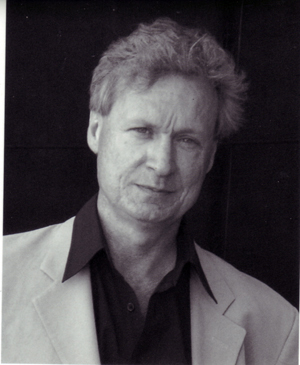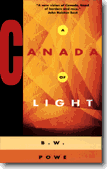other publications
Bruce Powe & the Solitary Outlaws

Out age. Bring the age out into the open, its obsessions and potential. Out age. It's time when each person can become the antenna of the race.
(B.W. Powe, Outage: A Journey into Electric City)
In A Climate Charged (1984), B.W. Powe displayed a unique ability to write traditional cultural and literary criticism with a heart of rock 'n roll. Since then, his cultural writing has traversed the common ground between the personal and the political...and back again. The Solitary Outlaw profiles five men--Pierre Trudeau, Wyndham Lewis, Glenn Gould, Elias Canetti, and Marshall McLuhan--all of whom felt "the power, passion, and accountability of the printed word":
All are private men who went outside into their society. This tension between privacy and publicity is a source of their strength, and of their complexity. They are divided men who often contained within themselves the turbulence of their time and place...Each tried to understand the role of the rational and humane action in an often self-desructive world; each saw communication between individuals as a necessity, and when each returned to privacy or silence, he remained resistant to an easy scan of his character. (6)
The same can be said of B.W. Powe: a writer and thinker who resists an easy scan of his character; a private individual who thrusts himself onto the stage of public discourse with tales of personal passions and redemptions; an artistic intellectual.
a (tremendous) Canada of light
 Originally published in 1993 as a tremendous Canada of light, this short book is Powe's heart-felt letter to both Brian Mulroney and Canada. To Mulroney, he asks, "So when there is massive debt, how do you best employ your vanishing financial resources?" Powe imagines Mulroney's response: "Drop the walls of government regulation, diminish the role of the federal government, dismantle the unprofitable Crown corporations, let the transnationals rule, change the symbolism of Canada from a place with a distinctive and yet enigmatic and withdrawn spirit to a commodity for investment and sale" (18). Carrying on in the tradition of George Grant's lament, Powe sums up the Mulroney leagacy: "What looked like the removal of domineering government forces became the abdication of government responsibility. What was supposed to be an agenda of renewal became the politics of deal-making and retrenchment, of slash and burn" (27). Not a pretty picture.
Originally published in 1993 as a tremendous Canada of light, this short book is Powe's heart-felt letter to both Brian Mulroney and Canada. To Mulroney, he asks, "So when there is massive debt, how do you best employ your vanishing financial resources?" Powe imagines Mulroney's response: "Drop the walls of government regulation, diminish the role of the federal government, dismantle the unprofitable Crown corporations, let the transnationals rule, change the symbolism of Canada from a place with a distinctive and yet enigmatic and withdrawn spirit to a commodity for investment and sale" (18). Carrying on in the tradition of George Grant's lament, Powe sums up the Mulroney leagacy: "What looked like the removal of domineering government forces became the abdication of government responsibility. What was supposed to be an agenda of renewal became the politics of deal-making and retrenchment, of slash and burn" (27). Not a pretty picture.
In answer to his indictment of Mulroney, Powe articulates his own vision of Canada, a "communications state."
I perceive communication to be the value of Canada, a state where understanding and misunderstanding, where constant negotiation and the limits of language, coexist. We have had to learn how to contact one another over an enormous land space, across five and a half time zones, in what was a wilderness of scattered settlements. Technology forges connections and disconnections here. (51)
There is a symbiosis between the Canadian national identity and our technologies of communication: from the fur trade and transcontinental railway, to the CBC, NFB, Globe and Mail, and Northern Telecom. For Powe, the CN Tower is "a power point symbolic of invisible flux and transmission." Our state is "a place of multiple voices, not one voice, a polyphony that can become a deafening cacophony" (52). "..[O]ur story is about the value of communication itself."
Canadians have a "discontinuous character" according to Powe, in that they have "lived with, invited and responded to many stories, moods and visions, and many different kinds of people...[T]he Canadian space has always been a through-zone, adaptable and reflective, a medium through which questions, pulses and ideas pass" (68-9). Here we see the national character, so resistant to summary, defined as a medium, not a message. In this view, Quebec becomes an opportunity for dialogue, not a province seeking political and cultural autonomy. (Where else in the world do people discuss revolutionary independence, at length, in a national assembly?):
Canadians...appear to be capable of wearing many masks, capable of flexible positions and improvised responses. Some say this is bland; others call it tact and civility. I say it's a realistic understanding of what it means to exist in the global society, the planetary culture, where private identity must be cloaked if it's to maintain solitude, integrity, mystery. (72-3)
In the end, Powe belives that Canada's spirit is an "improvisational one" (79) involving a "genuine plurality of different approaches and interpretations" (76). While we may appear to be solitary, ambiguous outlaws on the global stage, we are certainly not speech-less, nor without self-consciousness and ethical awareness in our noisy communications state.
There was always music in our house, music that was recorded and live, music on radios and stereos, on black discs and tapes, reel-to-reel and eight-track cassettes, in the guitars and other instruments my sister and I had. Music is the one key that helps me recall things. It's music that gives a shape to my memories.
(Bruce Powe, Outage: A Journey into Electric City [1995])